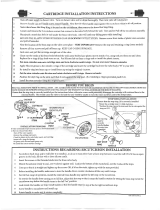
* WARNING - Never try to stop dripping by applying extreme force or overtightening the handle.
MALFUNCTION CAUSE REMEDY
Opening immediately to hot water.
Hot and cold water supplies have been
connected in reverse. Rotate cartridge. (See Page 3)
Water drips after shutting off the
valve. Residual water in valve and piping. Allow approximately 3-8 minutes to drain.*
Incorrect setting of the mechanical stop
against the stop block causing a partially
opened cartridge. Reset the mechanical stop. (See Page 3)
O-ring seal on the inlet of the cartridge is
faulty or seat assembly is damaged.
Check the O-ring & seat for cuts or over-
heating damage during installation.
Replace if necessary.
Water insufficiently hot.
Adjustable handle position stop incorrectly
set.
Refer to the instruction on “Setting
Temperature Limit Stop”.
Valve body too deep into wall.
The measured rough in or finished wall sur-
face is incorrect. Reset the valve.
Diverter will not stay on during show-
er.
Not enough backpressure between shower-
head and diverter valve. Flow restrictor @ shower head 2.5 GPM
No or low flow of hot or cold water.
Either the hot or cold side is not fully pres-
surized.
Verify that all service stops for both the hot
and cold are fully open and pressurized.
Debris caught inside the inlet of the car-
tridge.
Remove the cartridge (See Page 3). If
debris is lodged in the inlet of the cartridge
or check the valve located in the cast valve
body. The debris can be removed with a
straightened paper clip or fine wire. Gently
insert the wire and move it in a circular
motion to dislodge any debris.
(949)417-5207
NWP-1-594 Santa Ana, CA 92704 9/23/2013
www.brasstech.com
REV A
page 5 of 10nwp_ 1-594/1-684_rev B











